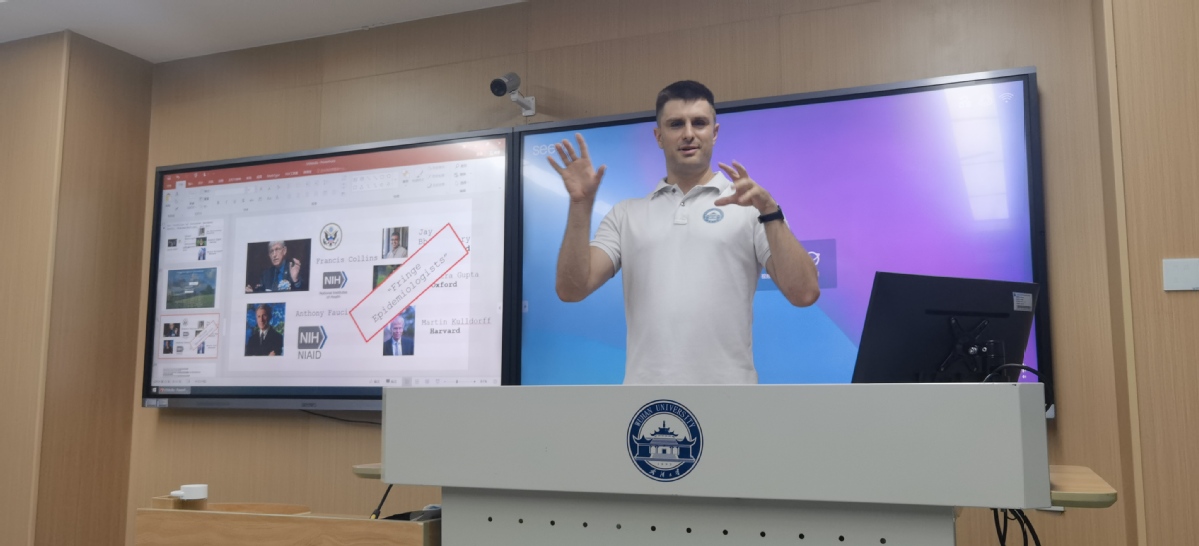
Schrag-Toso gives a speech at class. [Photo provided to chinadaily.com.cn]
It is hard to imagine that Aaron Schrag-Toso from the United States has only spent half a year in China, yet he speaks proficient Mandarin and understands key Chinese political concepts such as "lucid waters and lush mountains are invaluable assets" and "building a community with a shared future for mankind".
Schrag-Toso, 34, is a first-year postgraduate student at Wuhan University's School of Journalism and Communication. He came to China as a participant in the Luojia Global Summer School Program last year and began his postgraduate studies in September.
"The learning process isn't magic. I've actually spent a lot of time and energy learning Mandarin, which is beautiful but difficult, and I still have a long way to go," he said.
Schrag-Toso's undergraduate major was Spanish translation. He initially attempted to study Mandarin during his undergraduate years but found it intimidating. However, after graduation, meeting new Chinese friends reignited his interest in learning the language and his hope of visiting China.
Before arriving in China, Schrag-Toso worked as an English teacher in Spain and later as a translator. He's also worked for the US Census Bureau, and as a truck driver. Despite existing bias against China in the US, his determination to cross the Pacific never wavered, and his parents supported his decision.
Over the past six months at Wuhan University, he has experienced a significant change in mind-set and deeply believes that communication can dissolve prejudice, and understanding can transform perceptions.
Unlike many foreigners who develop an interest in China through films featuring Bruce Lee or Jackie Chan, Schrag-Toso said his fascination with the country began through friendships with Chinese international students, visiting scholars and immigrants. He continues to find Chinese people and culture exceptionally welcoming and fascinating.
He also recognized that China's global influence is increasing, and making Mandarin learning a practical investment. After taking two semesters of Chinese courses, he supplemented his studies with language-learning apps and flashcards.
"Nonetheless, learning the language and understanding China's long history and captivating culture is no easy task," he said.
Amid increasingly complicated China-US relations, Schrag-Toso noted that many US citizens around him are influenced by US biases against China.
"Many of my friends think it's not safe or free to come to China. However, in my opinion, the opposite is true," he said. "Influenced by such stereotypes, it's even more important to come to China and understand the nation."
At Wuhan University, he has studied Chinese geography, history, Marxism and socialism with Chinese characteristics. He celebrated the Dragon Boat Festival at a friend's home in Chongqing and plans to visit Zhejiang province for his first Spring Festival in China.
Ji Li, a professor at Wuhan University's School of Journalism and Communication and head of the summer school program, said Schrag-Toso was the only Western student in the program. She noted that sustainable development is a key topic of discussion among students from different countries, and they engaged in in-depth group tasks to explore the subject.
Schrag-Toso said he has made many Asian friends through the program. "It's easy for us to find common ground. Cultural differences are sometimes evident, but they can be fun to explore and understand," he said.
He is particularly impressed with China's ecological protection efforts such as the conservation of migratory birds at Poyang Lake and finless porpoises in the Yangtze River.
He noted that China not only focuses on improving the environment but also prioritizes people's livelihoods in the process such as helping former fishermen find new jobs after the Yangtze River fishing ban.
"The concept of 'lucid waters and lush mountains are invaluable assets' is both romantic and reflective of collectivism," he said.
Schrag-Toso expressed pessimism about US foreign policy and media bias but emphasized that he hopes China refrains from being provoked by the West, as it would only exacerbate tensions rather than foster understanding.
A staunch supporter of China-US cooperation, he believes that improving bilateral relations lies in people-to-people exchanges, especially among younger generations.
"Young people in the US are very interested in China, as shown by the recent spike in downloads of the Chinese social media platform Xiaohongshu," he said. "This kind of online interaction can hopefully lead to more face-to-face interactions and friendships."
He praised China's recent introduction of a 10-day visa-free travel policy, which he believes will help more Americans visit and break stereotypes while fostering understanding.
Professor Ji noted that Schrag-Toso is dedicated to his studies and has set a goal of introducing Chinese culture and philosophy to the world in a clear and concise way.
Schrag-Toso often shares his daily life and photos with his parents and relatives in the US, and plans to invite them to travel to China this year.